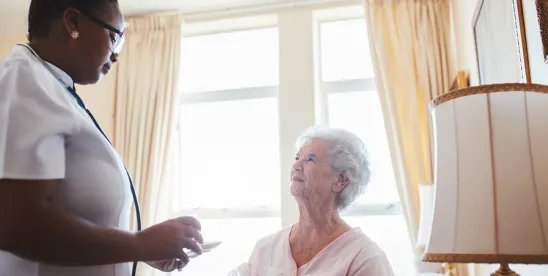New York State has adopted new law that establishes the advanced home health aide (AHHA) job designation. The AHHA program was first recommended in 2011. Governor Andrew Cuomo signed S. 8110/A.10707 into law on November 28, 2016.
The new law amends sections of Article 139 of the Education Law (relating to the practice of nursing), as well as provisions of Article 36 of the Public Health Law (relating to home care agencies).
What is an AHHA?
The new law defines an AHHA as a certified home health aide:
-
who meets certain regulatory requirements (discussed below),
-
is listed on the New York State Department of Health home care services worker registry, and
-
meets any other requirements established by the Commissioner of Health by regulation.
An AHHA is authorized to perform “advanced tasks” without violating the legal proscriptions against the unauthorized practice of nursing.
How are “advanced tasks” defined?
The new legislation adds a broad description of minimum “advanced tasks.” These include the administration of medications that are routine, pre-filled, and otherwise relatively easy to administer (which would not include medications that require injections (other than insulin/diabetes care injections and other specified injections, sterile procedures, or central line maintenance)). The entity employing the AHHA will be required to establish a protocol to address drug diversion.
The Commissioners of Health and Education are directed to promulgate regulations to otherwise specify what will be included in “advanced tasks.”
How are supervision, assignment, and delivery of services addressed in the legislation?
The yet-to-be-promulgated regulations will further define the scope of supervision, assignment, and delivery of services, including the following:
-
Direct supervision of advanced tasks by a registered professional nurse (RN). Such supervision must include training, performance assessments, a comprehensive initial assessment of patient needs (with regular, ongoing assessments thereafter), personal supervisory visits at least every two weeks, and 24/7 RN availability by phone. The regulations also will provide guidance on what constitutes reasonable and prudent supervision under certain circumstances (such as patient care needs, case mix complexity, and geographic considerations).
-
Performance of advanced tasks in accordance with a plan of care ordered by an authorized health care provider.
-
A process for RNs to assign advanced tasks. The process must include, at a minimum, consideration of the competency of the AHHA to perform the task, the willingness of the AHHA to perform the tasks, the ability of the AHHA to effectively communicate with the patient, and case-specific training at the time of assignment. These regulations will give the supervising RN discretion, free from coercion or retaliation, in deciding whether advanced tasks will be assigned. They also will address the ability of the patient to decline the services of the AHHA and allow the supervising RN to revoke an assigned task.
-
Experience, training (to include didactic, clinical, and supervised clinical practicum components), and other “appropriate qualifications” for AHHAs. An AHHA also must pass a competency examination.
-
Required documentation by the AHHA of advanced tasks performed, and prohibitions on the AHHA holding himself or herself out as a nurse, assessing medication or medical needs of patients, or performing tasks that exceed the scope of practice of a licensed practical nurse or that have not been appropriately assigned.
What provisions relate to supervision of AHHAs?
A section of the new law authorizes RNs to assign and supervise the advanced tasks and includes additional requirements. Before assigning an advanced task, the RN must complete a nursing assessment and provide the AHHA written, individual-specific instructions for performing the task, as well as criteria to identify, report, and respond to problems. The RN has affirmative obligations to ensure assignments are made only where the advanced task is consistent with the plan of care, the AHHA has been provided with case-specific training from the RN, where the RN can personally verify the AHHA can perform the task safely and competently, effectively communicate with the patient and understand the patient’s needs, and where the advanced home health care aide is willing to perform the task.
What entities will this program apply to?
The regulations will encompass the following entities:
-
certified home health agencies,
-
licensed home care services agencies,
-
hospices, and
-
enhanced assisted living residences.
The criminal background and fingerprinting requirements currently applicable to nursing homes, certified home health agencies, licensed home care services agencies, and long-term home health care programs also will apply to prospective hospice workers. The regulations also will provide for reporting between the Departments of Education and Health on licensed practical nurses who are or have been AHHAs and on improper behavior by RNs who are supervising AHHAs.
What is the effective date of the legislation?
While the legislation references a report due September 1, 2016, that will provide guidance on the advanced tasks that AHHAs will perform (and which presumably would be used as a basis for the regulations), the workgroup that is supposed to generate this report has not yet been formed (as the legislation had not been signed as of that date). It is expected that the workgroup now will be formed and the report will follow.
The significant sections of the legislation are effective in 18 months — however, no advanced tasks may be performed prior to the adoption of the regulations (including those addressing training and competency examinations). The legislation is deemed repealed as of March 31, 2023; a report is required on the implementation of the AHHAs program on or before October 1, 2022.





 />i
/>i

